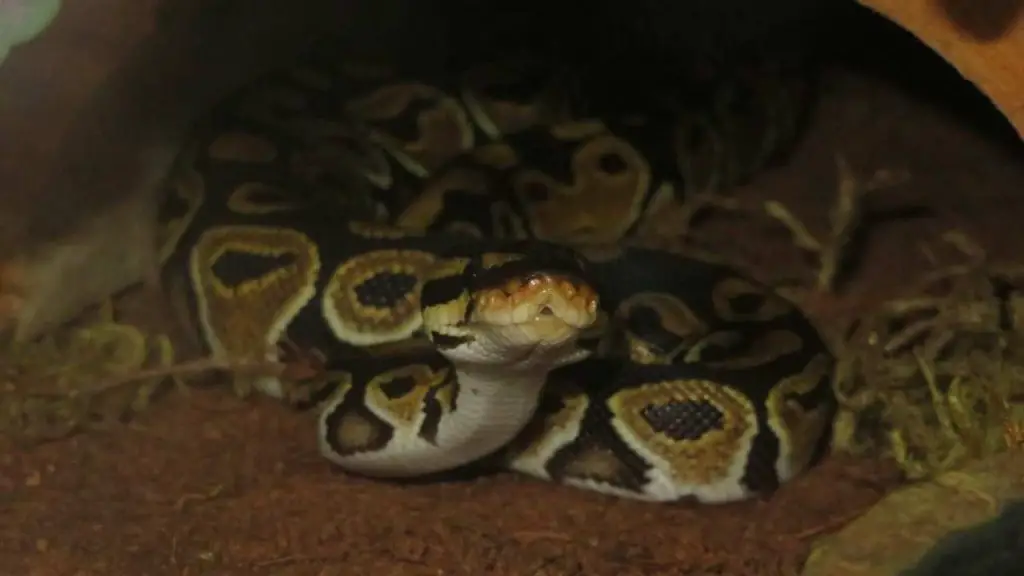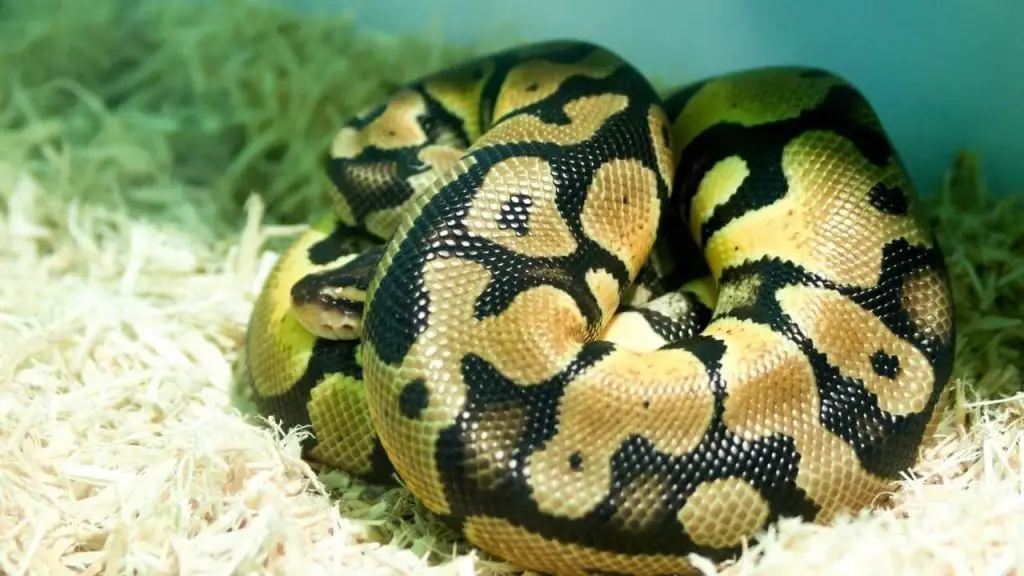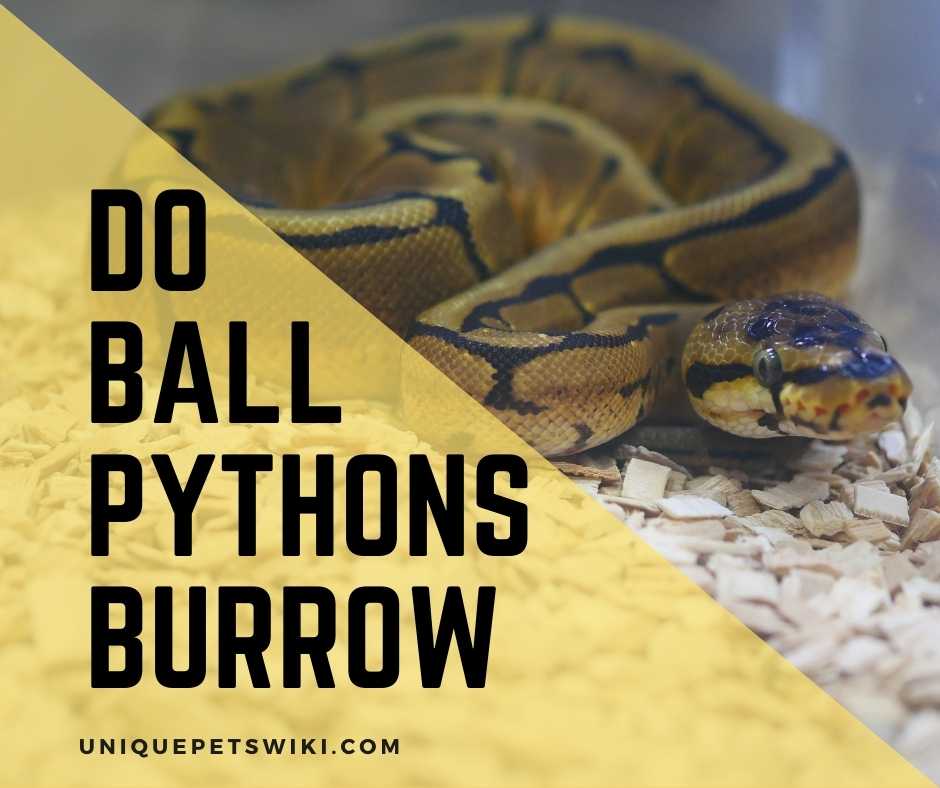Many snakes such as the Calabar burrowing python are classified as ground burrowers. These types of snakes can create their burrow in the wild. Thus, in captivity, they would likely need heavy substrates so they can burrow in.
But what about ball pythons? Do they burrow in the wild? Are their bodies built to burrow? Is it something you should worry about when your ball python burrow?
I have seen many ball python keepers panic when they notice their pet snakes burrowing. Most of these keepers are first-time pet ball python owners. If you’re wondering what is wrong that your snake is burrowing instead of using its hide, then this article is for you.
In this article, you’ll find answers to questions bothering around ball pythons burrowing and digging. Keep reading.
This article has been reviewed by Dr. Gospel. Read more about our knowledge control process here.
Contents
Do Ball Pythons Burrow?

In The Wild, Ball Pythons Live In Burrows. Since they’re nocturnal animals, they stay hidden in burrows during the day. At night, they come out foraging. Thus it wouldn’t be out of place to say that yes, ball pythons burrow both wild and in captivity.
But do ball pythons dig the tunnels or caves which they burrow in? No, they make use of termite mounds or burrows of rodents. They can also live in rock piles, piles of leaves, underneath rocks, or anything warm and dry.
As pets, to replicate the wild, ball pythons stay hidden in their hides during the day. The hides in captivity take the place of the termite mounds, rodents’ burrows, and many others in the wild.
Going by their physical build-up, they are incapable of digging through hard surfaces or dirt to create burrows. The reason is that ball pythons naturally have soft scales and fleshy snouts that cannot dig the hard ground.
However, as pets, aside from their hides, they can make burrows with their beddings. This is simple for them because their substrate isn’t as hard as the earth in the wild.
Since their beddings are usually loose and lightweight, they can easily slither in and out just as they would in the wild with leaves and sand.
Why Do Your Ball Python Burrow? 04 Reasons Your Ball Python Is Burrowing

Every ball python is unique and should be treated as an individual snake because each individual has individual personalities.
While some in captivity enjoy burrowing, others do not. While some others would prefer to create their special burrows, others are fine with their hides.
Whichever is your snake’s personality, you should know what works well with your snake. You should always show concern whenever you notice a behavior that isn’t common to your snake or other snakes in general.
That said, if your ball python suddenly starts burrowing when it has never burrow before, it’s a sign that something is wrong. In that case, you have to check for these factors.
Incorrect Or Wrong Humidity
Ball pythons need a humidity range of 50-60% to thrive in captivity. When they’re in a shed, they need an increase in humidity levels up to 70%. Thus, if your snake’s cage is too dry, it would burrow underneath its beddings to get some groundwater.
You’ll also notice your snake soaking in its water dish more often than usual. To ensure that your humidity is at appropriate levels, use a hygrometer in its cage to keep tabs on the moisture. Ensure that with the hygrometer, the humidity is within the ideal range.
Incorrect Or Wrong Temperature
In the wild, ball pythons burrow to keep warm. In captivity, their enclosure should be kept at 90-95° F warm and 70-80° F cool. Depending on how the enclosure is heated, your ball python may be burrowing because it’s feeling too hot or too cold.
If you’re using an under-tank heater and your ball python is burrowing underneath its beddings, it means that your snake wants to get enough heat.
This may mean that the heater isn’t heating as supposed to, thus your snake burrows under its beddings to get close to the heat mat. But if your snake does this on the cool side of the vivarium, then it means that the cage is too hot.
Ideally, you should have a thermostat in your pet’s vivarium to keep tabs on the temperature.
Stress Or Illness
A stressed or sick ball python would spend more time in burrows resting than exploring. When they’re sick in the wild, they remain hidden to avoid being attacked by predators.
However, in captivity, ball pythons would instinctively hide to avoid being seen when they’re sick. They usually do this so they would have enough time to heal. In most cases, stress caused by boredom can make pet ball pythons burrow.
Ball pythons do burrow. That is why it’s advised that you provide enough hides and other enrichments to keep your snake busy. You’ll need enrichments such as fake plants and branches.
Lack Of Appropriate Hides
As discussed earlier, lack of hides or not providing appropriate sizes can cause stress for ball pythons.
An ideal hide is one that’ll cover the snake’s whole body without revealing any of its parts. At the same time, it shouldn’t be too big for the snake when it curls in. These are the kind of hides that the snake will feel secure and safe.
If the hide is too small, too tight on them, or too big, they would feel stressed and insecure. This will make your snake decide to burrow underneath its beddings instead.
Do You Need To Worry When Your Ball Python Burrows?
Ideally, as a good ball python keeper, you should provide proper size hides for your ball pythons to burrow in. If hides are provided in abundance, they wouldn’t feel the need to create other burrows.
But as said earlier, since their beddings are usually loose and lightweight, they would snuggle in from time to time to hide. When this happens, you may not need to worry.
But if it often happens over a specific time frame, you need to evaluate your husbandry. Something is likely wrong with their vivarium humidity or temperature.
Will Burrowing Hurt My Ball Pythons?
Since ball pythons themselves will not make the tunnels and cave in which they burrow, needless to worry if it’ll hurt them or not. However, it’ll hurt them if they should attempt to create their burrowing tunnels themselves.
Why Do Your Ball Python Burrow Under The Water Bowl, Hides, Or Bedding?
It’s normal for ball pythons to stay in hides. It makes them feel safe and secure when they don’t want to explore. Nonetheless, when your ball python burrows under the water bowl, the vivarium is likely too hot, humidity too low, or its hides aren’t appropriate.
If it’s because the temperature is too high, the snake is trying to cool off under its water bowl. If it’s low humidity, then your snake is trying to get some underground water.
The wrong size of hides can discomfort your pet ball python to seek to burrow somewhere other than its hides.
Besides the fact that ball pythons can slither through their beddings, the four factors discussed earlier can make ball pythons in captivity burrow under their beddings.
Wrapping Up
While many researchers hold the opinion that ball pythons don’t burrow, your snake may be different. Indeed, ball pythons don’t burrow in the wild. They only make use of tunnels and caves of rodents and also termite mounds.
Thus, in captivity, burrowing under the beddings and their water bowl indicates that something is wrong with your husbandry. Note that your snake can burrow under its beddings or water bowl doesn’t mean something is wrong with your snake.
It simply means something is wrong with your husbandry. In that case, you need to evaluate your husbandry. Once your husbandry is evaluated, ensure you fix all issues with poor husbandry.
